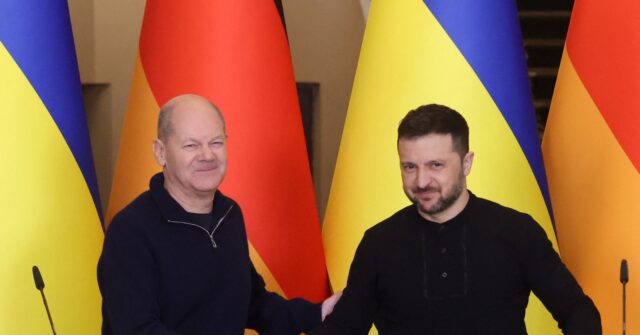German Chancellor Olaf Scholz made a significant visit to Ukraine recently, marking his first trip in over two years amidst a backdrop of ongoing war and political tension. His dialogue with Ukrainian President Volodymyr Zelenskyy was tinged with controversy, particularly in light of a recent phone call Scholz had with Russian President Vladimir Putin. Zelenskyy had previously rebuked Scholz for this call, arguing that it could undermine Ukraine’s standing and promote a narrative that mitigates Russia’s isolation due to its invasion. As the military conflict extends into its fourth year, the resilience of Western support for Ukraine is increasingly seen as vital, especially with the impending transition of power in the United States that might alter Ukraine’s strategic landscape.
The war in Ukraine now stands at a crucial juncture, with the U.S. presidency potentially poised to shift in direction at the beginning of the upcoming year. Trump’s administration might adopt a different stance regarding the conflict. This situation has raised concerns within Ukraine regarding the potential disunity among its Western allies. Putin is relying on the hope that fatigue will set in among Western nations, thus outlasting their commitment to support Ukraine in its fight against Russian aggression. Zelenskyy’s comments reflect growing anxiety about preserving that unity and the risks associated with perceived slippage in Western resolve.
At the heart of Scholz’s visit was a reaffirmation of Germany’s support for Ukraine. However, despite Germany being the second-largest supporter of Ukraine after the U.S., Scholz maintained a firm stance against Ukrainian pleas for specific military support measures. In particular, he has resisted calls to supply Taurus long-range missiles and to expedite NATO membership for Ukraine. Scholz described his approach as “prudent,” emphasizing the need to bolster Ukraine without escalating into broader NATO-Russian conflict, a careful diplomatic balancing act aimed at sustaining German support while mitigating risks of wider war.
During discussions, Zelenskyy expressed a willingness to explore the possibility of NATO membership for Ukrainian-controlled territories as a means to potentially bring an end to hostilities. Yet, Scholz urged caution regarding rapid NATO membership talks, framing the push for peace as a priority that should not come at the expense of Ukrainians’ own interests. Germany has played a prominent role in providing military assistance and Ukraine’s defensive capabilities. The current military aid package includes advanced air defense systems and other weaponry, highlighting the extent of Germany’s commitment to enhancing Ukraine’s defenses against ongoing Russian attacks.
The military landscape continues to evolve as Ukraine faces ongoing bombardments from Russian forces. Recently, President Zelenskyy reported that Russia has launched close to 350 missiles at various civilian and critical infrastructure targets in Ukraine, underscoring the urgency for enhanced air defense systems. Zelenskyy pointed out that crucial facilities remain vulnerable, indicating a pressing need for additional support from Western allies to protect against relentless attacks targeting essential services such as power grids.
In conclusion, Scholz’s visit to Ukraine signifies a complex landscape of diplomacy amid warfare. While Germany reaffirms its commitment to Ukraine, the conversations around military support and NATO membership highlight the intricate dance of international politics at play. With heightened Russian aggression and a shifting geopolitical environment due to prospective changes in U.S. leadership, the stability of Western unity in supporting Ukraine is of paramount importance. As both leaders navigate these challenges, it’s clear that strategic decisions will have far-reaching implications for the continued fight against Russian encroachment and the future of Ukraine as a sovereign entity.

